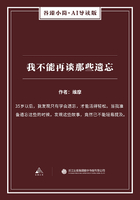One reporter especially, a space writer, managed for a long time to get from me one-half to a column nearly every day, sometimes appearing as interviews and at other times under the general phrase: "It has been learned from a reliable source."I recall a personal incident out of the ordinary. I was awakened one stormy winter night by a reporter who was well known to me, a young man of unusual promise. I met him in dressing gown and slippers in my library. There he told me that his wife was ill, and to save her life the doctor informed him that he must send her West to a sanitarium.
"I have no money," he continued, "and will not borrow nor beg, but you must give me a story I can sell."We discussed various matters which a paper would like to have, and finally I gave him a veiled but still intelligible story, which we both knew the papers were anxious to get. He told me afterwards that he sold the interview for enough to meet his present needs and his wife's journey. Some time after he entered Wall Street and made a success.
I have known well nearly all the phenomenally successful business men of my time. It is a popular idea that luck or chance had much to do with their careers. This is a mistake. All of them had vision not possessed by their fellows. They could see opportunities where others took the opposite view, and they had the courage of their convictions. They had standards of their own which they lived up to, and these standards differed widely from the ethical ideas of the majority.
Russell Sage, who died in the eighties, had to his credit an estate which amounted to a million dollars for every year of his life.
He was not always a money-maker, but he was educated in the art as a banker, was diverted into politics, elected to Congress, and became a very useful member of that body. When politics changed and he was defeated, he came to New York and speedily found his place among the survival of the fittest. Mr. Sage could see before others when bad times would be followed by better ones and securities rise in value, and he also saw before others when disasters would follow prosperity. Relying upon his own judgment, he became a winner, whether the market went up or down.
I met Mr. Sage frequently and enjoyed his quick and keen appreciation of men and things. Of course, I knew that he cultivated me because he thought that from my official position he might possibly gain information which he could use in the market. I never received any points frorn him, or acted upon any of his suggestions. I think the reason why I am in excellent health and vigor in my eighty-eighth year is largely due to the fact that the points or suggestions of great financiers never interested me. I have known thousands who were ruined by them. The financier who gives advice may mean well as to the securities which he confidentially tells about, but an unexpected financial storm may make all prophecies worthIess, except for those who have capital to tide it over.
One of the most certain opportunities for fortune was to buy Erie after Commodore Vanderbilt had secured every share and the shorts were selling wildly what they did not have and could not get. An issue of fraudulent and unauthorized stock suddenly flooded the market and thousands were ruined.
As Mr. Sage's wealth increased, the generous and public-spirited impulses which were his underlying characteristics, became entirely obscured by the craze for accumulation. His wife, to whom he was devotedly attached, was, fortunately for him, one of the most generous, philanthropic, and open-minded of women. She was most loyal to the Emma Willard School at Troy, N. Y., from which she graduated. Mrs. Sage wrote me a note at one time, saying: "Mr. Sage has promised to build and give to the Willard School a building which will cost one hundred and fifty thousand dollars, and he wants you to deliver the address at the laying of the corner-stone."I wrote back that I was so overwhelmed with business that it was impossible for me to accept. She replied: "Russell vows he will not give a dollar unless you promise to deliver the address. This is the first effort in his life at liberal giving. Don't you think he ought to be encouraged?" I immediately accepted.
Mrs. Sage was a Mayflower descendant. At one of the anniversaries of the society she invited me to be her guest and to make a speech.
She had quite a large company at her table. When the champagne corks began to explode all around us, she asked what I thought she ought to do. I answered: "As the rest are doing." Mr. Sage vigorously protested that it was a useless and wasteful expense.
However, Mrs. Sage gave the order, and Mr. Sage and two objecting gentlemen at the table were the most liberal participants of her hospitality. The inspiration of the phizz brought Sage to his feet, though not on the programme. He talked until the committee of arrangements succeeded in persuading him that the company was entirely satisfied.
Jay Gould told me a story of Sage. The market had gone against him and left him under great obligations. The shock sent Sage to bed, and he declared that he was ruined. Mr. Gould and Mr. Cyrus W. Field became alarmed for his life and went to see him. They found him broken-hearted and in a serious condition.
Gould said to him: "Sage, I will assume all your obligations and give you so many millions of dollars if you will transfer to me the cash you have in banks, trust, and safe-deposit companies, and you keep all your securities and all your real estate." The proposition proved to be the shock necessary to counteract Sage's panic and save his life. He shouted, "I won't do it!" jumped out of bed, met all his obligations and turned defeat into a victory.
Sage could not personally give away his fortune, so he left it all, without reservations, to his wife. The world is better and happier by her wise distribution of his accumulations.















